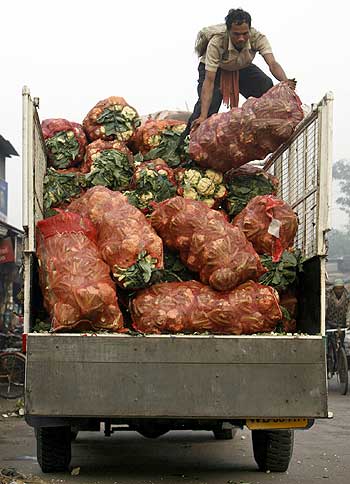
At the beginning of the last year Prime Minister Manmohan Singh assures us that inflation will come down by March.
In March, after the Budget was presented the same year, Finance Minister Pranab Mukherjee assures us that the effect of his budgetary proposals in controlling inflation will be visible by May.
In May, Deputy Chairman of the Planning Commission Montek Singh Ahluwalia tells us that inflation will come down once monsoon is fully active across the country.
But monsoon in real life is either in excess or in deficit; never 'perfect' or 'normal'.
. . .
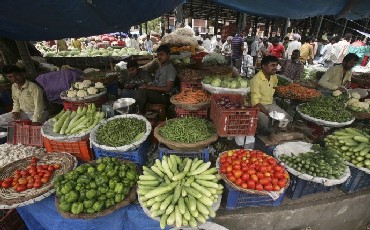
So by August, the economic advisor to the prime minister tells us that inflation continues to be high because of drought or floods, or for that matter, both.
In October, the economic advisor to the finance minister takes over and tells us that inflation is high on account of higher demand during the festival seasons between September and November.
The prime minister then takes over at the beginning of this year and resumes the same story all over once again.
I may not have got the sequence right regarding the utterances of these men -- but I am sure that this is the sum and substance of the 'response' of the government's agenda to fight inflation.
. . .

What is appalling to note here is that the government is completely cut off from the causes that drive inflation in India and hence, to that extent, clueless in working out a solution.
FDI in retail: Voodoo economics at its best
In the last week of May 2011, a high level government committee headed by Kaushik Basu, chief economic advisor, recommended the contentious policy issue of opening up of multi-brand retail to foreign direct investment -- ostensibly to rein in inflation.
While the copy of the report has not yet been made public, press report suggests that the core arguments contained in the report were that inflation prevailing in the country was primarily on account of issues contained in managing supplies from the farm gate to the consumers.
"The gap between farm gate prices of agricultural produce and the retail prices (in India) are amongst the highest in the world as also amongst the emerging markets. China, which opened its retail sector to FDI in 2004, has shown the benefits of opening of the sector and having in more players," Basu is reported to have said.
. . .
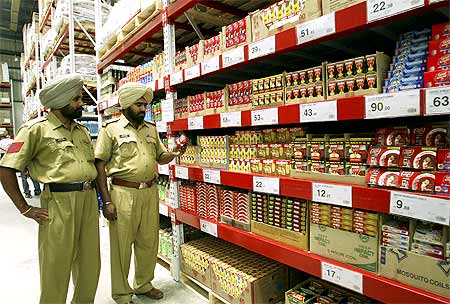
Suddenly Chinese statistics have become credible. Press reports also suggest that this study was inspired by a similar research by the International Monetary Fund (whose credibility too is questionable) which suggested allowing FDI In retail trade could dampen inflationary pressures.
It is indeed pertinent to note that organised retail in India is less than 5 per cent when compared to 20 per cent in China and in excess of 50 per cent in some of our Asian neighbours.
But one must understand the difference between organised retail (where domestic capital is used) and allowing FDI in retail, where the presumption is that it is foreign capital, technology and management that would do the trick!
The underlying logic for this suggestion is that FDI in retail would reduce losses in transportation, improve logistics, reduce prices, provide remunerative prices to farmers and open up foreign markets for our small and medium enterprises.
. . .

In short a win-win situation for everyone. Well, if wishes were horses, beggars would ride . . .
While it is indeed true that there is enormous scope for improvement in the management of our supply chain between the farm gate (or factory gate) and consumers, the fact remains that we are stuck with archaic laws, poor infrastructure and a very strong anti-reform lobby.
No wonder the Confederation of All India Traders (CAIT) strongly opposed the proposal to open up retail trade to FDI and said that the arguments in favour of it were 'totally irrational and illogical'.
While one may not entirely agree with the CAIT on its own counter arguments, one must concede that the CAIT is spot on when it says '. . . the argument that FDI in retail will tame inflation is nothing but an imaginary exercise by the people who have the tendency to ignore the ground realities'.
. . .

And controlling inflation by allowing FDI in retail to me is the crux of the issue. Is it wishful thinking? Is it an imaginary exercise? Or is it acting under the hydraulic pressure of the global retail lobby?
Whatever be it, the linkages between controlling inflation by allowing FDI in retail seem irrelevant, at best, and stupid, at worst.
By setting up a few malls in our cities one is not sure as too how the government can control inflation across the country. Either our government is too naive or simply believes in voodoo economics. Mostly the later, it appears.
A command performance?
In the run up to the visit of American President Barack Obama to India in 2010, Wal-Mart chief executive Mike Duke arrived in India a few days earlier to set the stage with a strong pitch for liberalising this industry.
. . .

Duke is reported to have stated that 100 per cent FDI in the Indian retail sector would 'help contain inflation in India'. He added that FDI in retail would contain inflation by reducing wastage of farm output, as 30 per cent to 40 per cent of the produce does not reach the end-consumer.
Also, "In India, there is an opportunity to work all the way up to farmers in the back-end chain. Part of inflation is due to the fact that produces do not reach the end-consumer," Duke said.
If controlling inflation was supposed to be an incentive to the consumer, Duke offered palliatives for Indian manufacturers too. According to him, allowing FDI into this sector "will also enable Wal-Mart to increase sourcing of products from India by developing more vendors here."
Well, if press reports are to be believed, the Kaushik Basu report in 2011 faithfully reproduced these arguments put forth by Mike Duke.
. . .
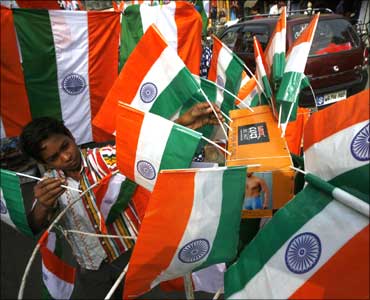
For the uninitiated, fashioning policy formulations by working through the government is part of a larger business strategy adopted by multinational retail giants.
Those who have been following developments in the past few years know that Wal-Mart alone must have spent millions of dollars in India for lobbying with our government to open up retail sector for FDI.
President Obama, no less, too is reported to have lobbied hard with the Indian government during his visit to India last year.
Is the Kaushik Basu report merely a part of this larger design? Or is merely coincidence? Was it a command performance? Well, your guess is as good as mine.
. . .
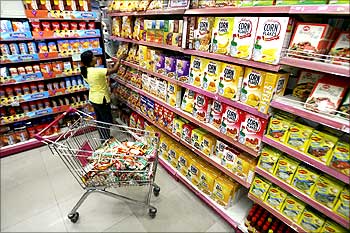
Nevertheless, we seem to ignore that the Doha Round negotiations are underway for over a decade now.
By unilaterally opening retail to foreign trade, we run the risk of getting far less in the multilateral negotiations of the Doha Round. And in such a scenario, we could end as net losers.
Similarly, the Kaushik Base report seems to suffer from a fatal flaw.
In a brilliant two-part article authored by Kamal Sharma and Jeevan Prakash Mohanty titled FDI in retail: A question of jobs, not ownership in retail (Business Line, Sept 29, 2005.) the authors point out: 'The primary task of the government is still providing livelihoods and not create so-called efficiencies of scale by creating redundancies. If we assume 40 million adults in the retail sector, it would translate into around 160 million dependents. Opening retailing to FDI means dislocating millions from their occupation and pushing vast number of families under the poverty line. The western concept of efficiency is maximising output while minimising the number of workers involved. This will only increase social tensions in a developing country like India, where tens of millions are still seeking gainful employment.'
. . .
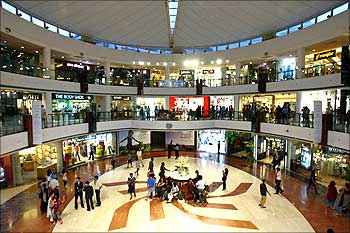
And should small retailers feel the pinch on account of unfair trade practices adopted by larger retailers, they are supposed to rush to the Competition Commission of India (CCI), file a petition hiring expensive Delhi-based lawyers and instantly get succour from the Commission. How stupid. How insensitive. How sinister.
Do the authors of this idea understand India, its complexities and the structure of its economy? The assumption as to how a small bureaucratic set-up in New Delhi can act as a countervailing force to tackle the monopolistic and predatory tendencies of large multinational corporate is indeed fatally flawed, especially in the context of such multinational corporate themselves fashioning polices of the government in the first place.
With successive governments in India acting heavily in favour of foreign interests, one gets a distinct feeling that more often than not, issues in India, in the immediate future, will increasingly get settled on the streets than through informed debates.
Allowing FDI in retail seems to be destined to be settled in the streets.
The author is a Chennai-based chartered accountant. Comments can be made at mrv@mrv.net.in